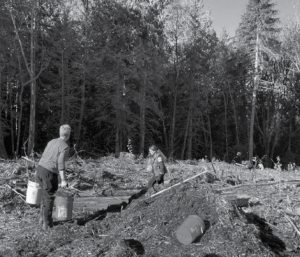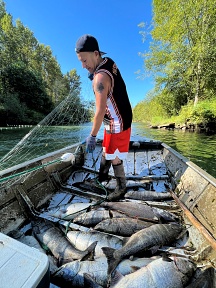Instead of seeing a legacy forest while driving north on Cooper Point Road in Olympia, you now see a devastated clearcut landscape and a large sign for OlyEcosystems, the new owner. They have already begun stabilization and restoration of the property with two community work parties that began planting trees in November. Members of the community have stepped in to restore this area critical for the Green Cove Watershed, its endangered salmon and mudminnow, and the City’s own drinking water supply.

Regulations that preclude public action
But the community never had a chance to prevent the destruction in the first place. Any attempt by the City, County and residents to interfere with logging is doomed by the procedures for obtaining a logging permit from the Department of Natural Resources (DNR), and by the process for appealing to the Pollution Control Hearings Board (PCHB)–no matter what the cost to the community and the ecosystem.
For Cooper Crest, appellants submitted proof that the Forest Practice Application for the logging permit contained falsehoods, and showed that DNR procedures for deleting streams from official maps had not been followed. Yet the appeal to the PCHB was summarily dismissed in September because the area was already cut. The PCHB’s refusal even to consider the evidence serves to encourage wrongdoing.
It matters who makes the rules
The 1974 Forest Practices Act (Act, FPA) states as part of its intent that: “… a viable forest products industry is of prime importance to the state’s economy” including environmental protection as “coincident with maintenance of a viable forest products industry.”
The Act established the Forest Practices Board to make rules governing timber harvests in 12 million acres of state-owned and private forestlands. The rules are implemented and enforced by DNR.
The Board has thirteen members, including designees from DNR, the Department of Commerce, Agriculture, Ecology, Fish and Wildlife, and eight people appointed by the Governor. These must include a County official and three representatives from the timber industry. The current Board has a fourth member from Weyerhaeuser. The Board of Natural Resources, which sets policies that guide how DNR manages state lands and resources, is also dominated by the beneficiaries of timber harvests.
The timber industry is woven in
It appears clear from the make-up of these boards that timber industry interests guided the development of the timber harvest rules. This makes it almost impossible for communities to challenge DNR policies.
The Pollution Control Hearings Board also has a conflict of interest that precluded an impartial hearing. The Attorney General’s office is obligated to defend state agencies, including DNR, even if DNR actions threaten ecosystems and people in the area, as happened at Cooper Crest. In the Cooper Crest appeal, the presiding judge of the three-member panel served as DNR’s representative in the Attorney General’s office for more than 26 years. In addition, the PCHB’s own rules for conducting administrative appeals do not conform to the rules of the Superior Court. These rules allowed the Board to dismiss the appeal before any hearing was held.
Legislation passed in 2020, HB2528, made logging part of the State’s climate mitigation strategy, covering all contributing aspects—landowners, pulp and paper mills, harvest and transportation infrastructure. Legislators allowed timber industry lobbyists to give testimony to legislators, while they shut out respected climate scientists who have consistently demonstrated that protecting both old growth and mature forests is the most effective strategy for sequestering carbon.
The courts can sometimes help
The preemptive nature of laws like HB2528 are typical of strategies used by powerful existing interest groups to restrict the power of local communities. Nonetheless, there are some avenues to petition the government for redress of grievances, a basic Constitutional right.
Sometimes the Courts can provide relief. The Center for Sustainable Economy just won a case against DNR, stopping two planned timber harvests in Jefferson County. DNR had failed to include a SEPA analysis of the climate impacts of clearcutting, which would leave land hotter, drier and more susceptible to fires.
Northwest Environmental Advocates won a case against the Department of Ecology and the EPA for failing to enforce Clean Water Act requirements to protect aquatic life from toxics.
Remedies for Olympia and beyond
We could spend years and thousands of dollars in the courts to prove that Washington’s forest practices are inadequate to protect water quality, fragile species and human health as required by federal law.
There are other options. In the case of Cooper Crest, RCW 64.12.030 allows the City to sue the logger for treble damages for timber trespass on the one acre of adjoining City property that was clearcut. Looking ahead, people can lobby their state legislators to reform the Forest Practices Act so that local critical area and tree removal ordinances prevail. We can complain to federal authorities. We can network with other groups challenging DNR policies. A new group, Cooper Crest Forest Defenders, will be pursuing as many of these paths as possible.
Power resides with the people
But there is a more fundamental principle at stake: democracy itself. Thurston County has dozens of single issue problems. There’s houselessness, developments at West Bay Woods, Toxic Waste Estates at the Sundberg site on Cooper Point Road—plus Capitol Mall/Triangle planning, the Olympia airport, warehouse expansions, the Port of Olympia’s budget, and more.
In each case with profound implications for the community, decisions are being made by people outside the community whose commercial interests run counter to the wishes of the public who will be most impacted.
The Community Rights movement envisions an electorate united by the fundamental Constitutional principle that power resides with the people. Every community, including the natural ecosystems of which they are a part, has the right to defend and enforce the collective rights of the community, its members and its environment.
Reframing issues as an absence of democracy provides an opportunity to educate our neighbors. When we question the legitimacy of those making decisions for our community we validate the need to localize decision making for our common well-being.
Esther Kronenberg studies and reports on the interaction between public agencies responsible for water quality and development decisions in West Olympia.

Ester,
We have similar problems with Pierce County and the City of Lakewood.
Our County Exec. decided to partially solve homeless problems by building a community of microhomes in a Federal wetland with no sewer service. They amended the community plan to change the zoning restrictions. The Environmental officer issued a Determination of Nonsignificance!! All this with little public input or opportunity to comment.
Lakewood decided to over treat Waughop Lake and killed the natural functions. 5 birds we counted this week by Audubon instead of the normal hundreds.